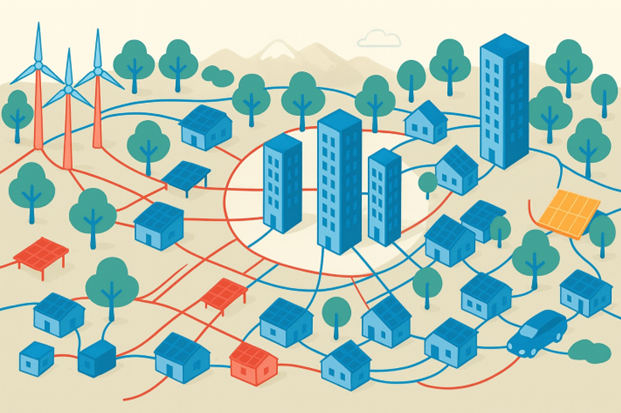Our insights
Working with our clients on critical challenges results in new industry insights, find below a selection of premium content generated by our experts:
Janus: A Next-Generation Grid Optimization Tool for Cost Reduction and Renewable Integration
Janus is a next-generation grid optimization tool designed to reduce redispatch costs and increase renewable energy integration. Unlike traditional methods that treat redispatch and topological adjustments separately, Janus optimizes both within a unified framework. This integrated approach improves grid efficiency, reduces costs, and minimizes renewable curtailment. Using advanced relaxation techniques, Janus solves complex, non-linear problems with high accuracy and speed, achieving a 0.2% tolerance gap—far better than existing tools. Currently in its proof-of-concept stage, Janus has shown promising results and is being prepared for pilot studies.
READ FULL ARTICLE
Balancing Market Efficiency and Grid Stability: Managing Redispatch Within Legal and Operational Limits
Europe’s electricity markets face rising redispatch costs and operational stress, highlighted by the recent Spanish blackout. While structural reforms like nodal pricing and bidding zone redefinition are the long-term solution, immediate action can be taken to maintain efficiency and system security within regulatory limits.
This paper proposes a practical interim solution to deliver significant cost savings. This two-track approach—short-term operational improvement alongside long-term market reform—offers a clear path to balance market efficiency with grid stability.
READ FULL ARTICLE
How Much Could South Asia Benefit from Regional Electricity Cooperation and Trade?
Demand for electricity in South Asia has been growing at annual rates close to 5% over the last decades supported by a sustained increase in access rates and in economic development. Currently, national power systems are operated and developed relatively independently, however, the modeling results indicate that the regional electricity cooperation and trade could reduce total undiscounted electricity supply costs in the region by US$222 billion, or more than US$9 billion per year until 2040.
READ FULL ARTICLE
Iberian electricity Iberian electricity system in the face of an increase in wind power generation
The security of supply is a fundamental issue in electrical power systems. Wind power generation, due to its variable and unpredictable nature, presents a challenge to power system operation. Wind power in Spain represents already more than 17% of the total installed power, and it is expected to represent a larger share in the future.
The study of wind power has high relevance in the Iberian Peninsula due to its limited interconnection capacity. The present article presents a study about the impact of wind power in the electrical grid
READ FULL ARTICLE
Large Scale Renewable Power Integrationwith Electric Vehicles
A transition from a fossil fuel based mobility to one based on electricity from renewable sources can allow for significant greenhouse gas reductions as well as of air pollutants and noise in urban areas. In addition, greater independence from imported oil in the transport sector can be achieved. One major advantage of electric vehicles is the high flexibility in charging times, which can be used to integrate renewable power generation and to make the operation of the system more efficient. The modelling exercise performed proves not only the feasibility of a power system with a RES share of over 85% assuming an ambitious network expansion, but also that electric vehicles can integrate the renewable power generation required for decarbonizing the transport sector.
READ FULL ARTICLE
Long-term scenarios and strategies for the expansion of renewables in Germany
The German government’s plans for the energy transition provide a long-term roadmap for the transformation of the energy supply in Germany. The challenges associated are considerable and not yet fully understood. This study presents the results of several investigations of the transformation considering electricity, heat and fossil fuels, clearly outlining the development scenarios for each, including dynamic simulations across Europe for validation considering the role of load balancing, network expansion, demand response and electricity storage among others.
READ FULL ARTICLE
Prospects for electric vehicles with a high share of renewables
The report evaluates up to 2050 the prospects of electromobility in a supply system with a high share of renewables. For this, several scenarios were assessed to identify the prerequisites for successful market development. Additionally, dynamic simulations of power system operation were carried out. The analyses show the potential of controlled charging of vehicle batteries for electricity balancing as well as, the feasibility of grid integration of electromobility and synergy effects with decentralized power generators at distribution level.
READ FULL ARTICLE
Revolutionizing Power System Planning for a Renewable Future
As the power sector transitions towards higher renewable energy penetration, traditional planning tools face significant challenges in delivering accurate and timely results. Many of these tools rely on simplifications such as load blocks or typical days, which can introduce errors of 50% in capacity expansion planning with high shares of variable renewables. Ceres, our advanced power system planning tool, addresses these shortcomings with state-of-the-art techniques, cloud computing, and cutting-edge acceleration technology. By considering every hour over a multidecade planning horizon, Ceres delivers precise and actionable results in under 30 minutes, facilitating the planning process for utilities, regulators, and policymakers.
READ FULL ARTICLE
Power System Reliability Analysis with Fides: A Breakthrough in Performance
Ensuring the reliability of power systems has never been more critical. As grids incorporate increasing amounts of renewable energy, accurate reliability assessment becomes essential to prevent blackouts and ensure economic operation. Traditional reliability assessment tools, while effective, often struggle with computational performance, requiring days to deliver results. Our new tool for power system reliability analysis, Fides, leverages an advanced implementation of Monte Carlo simulation, advanced variance reduction techniques, our proprietary acceleration technology, and cloud-based high-performance computing. With Fides, utilities and grid operators can obtain highly accurate reliability assessments in just minutes.
READ FULL ARTICLE
Navigating the energy transition safely: An optimal approach for optimal energy procurement
The world is at a pivotal moment in its energy journey. Electricity demand is rising across the globe as industries, heating and transportation electrify, urbanization accelerates, and digital transformation drives consumption upwards. At the same time, governments and businesses are facing mounting pressure to meet ambitious climate targets that call for a drastic reduction in carbon emissions. The growing demand for electricity, combined with the urgent need for decarbonization, presents a significant challenge for both government and private sector leaders.
READ FULL ARTICLE
Transforming Electricity Price Forecasting with Advanced Computing
Developing long-term electricity price scenarios and forecasts is crucial for market participants, including utilities, grid operators, energy traders, and policymakers. Accurate forecasting helps optimize bidding strategies, manage risks, and ensure system reliability. However, predicting electricity prices is inherently complex due to the high volatility of demand, renewable generation, fuel prices, and market conditions. Traditional models often rely on simplifications and heuristics that struggle to capture market dynamics accurately, especially with increasing renewable penetration.
READ FULL ARTICLE
Beyond IRR:
How Development Banks plan energy infrastructure and why it matters for policy design
Development banks such as the World Bank, ADB, and IDB plan energy infrastructure using economic analysis, rather than the financial logic of private investors. Their focus is not project bankability, but whether an investment or policy is the best use of national resources, considering system-wide costs, benefits, and externalities. This approach compares outcomes with and without the intervention, assesses alternative solutions, applies economic (shadow) prices, and values impacts such as reliability, equity, and greenhouse gas emissions. As a result, MDB energy planning and policy design aim to maximize social welfare and long-term efficiency, not private returns.
Hosting Capacity Methodologies in Power Systems with Increasing Flexibility and Resilience
Hosting capacity has become a critical concept for power system planning in increasingly saturated transmission and distribution networks. Traditionally treated as a static technical limit, hosting capacity is now strongly influenced by operational practices, flexibility resources and resilience requirements. Modern assessments must therefore move beyond simplified scenarios and incorporate full temporal resolution, advanced control capabilities, storage, flexible demand and active network operation. By framing hosting capacity as an operational outcome rather than a fixed constraint, planners and regulators can unlock significantly higher levels of renewable integration and electrification while maintaining system security and robustness.
Best Practices for Disaster Risk Management Studies in Power Transmission and Distribution
Disaster Risk Management studies are a core analytical input for financiers and public authorities when planning transmission and distribution under uncertainty. The objective is not the elimination of risk, but the systematic reduction of the likelihood and consequences of disruptive events, assessed at the level of the power system and society as a whole. Effective DRM links hazard characterization, asset vulnerability, and system-level impacts to quantify consequences such as service interruptions, economic losses, and impacts on critical services. By combining technical power system analysis with economic assessment, these studies support the prioritization of resilience measures that enhance reliability, protect vulnerable users, and ensure the efficient use of public resources over the long term.











